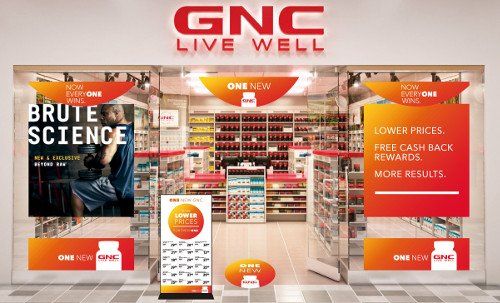NFL Pulls GNC’s Super Bowl Ad
GNC’s 30-second advertisement was pulled from the Super Bowl because the retailer sells products containing substances banned by the NFL.
Photo from GNC

Besides a thrilling game of football, yesterday’s Super Bowl gave us a slew of memorable new commercials that cost advertisers millions of dollars to show. But there was one notable exception from the cornucopia of advertisements: a 30-second spot from supplement retailer GNC that the National Football League (NFL) decided to pull just six days before the big game.
In December, GNC announced that it was launching its biggest marketing campaign to date, which would culminate in its Super Bowl ad. The commercial shows different people engaged in athletic feats, including a firefighter, a one-armed drummer, and a boxer, with a GNC logo appearing in its final seconds.
Fox, the network hosting the Super Bowl, originally approved the ad, GNC says, but reversed its decision less than a week before the game because some of GNC’s products contain three ingredients found on the NFL’s list of banned substances-DHEA, synephrine from bitter orange, and octopamine. As USA Today reports, NFL players are also banned from endorsing or having a business relationship with GNC, due to the retailer’s association with NFL banned substances.
Dietary-supplement industry stakeholders were quick to condemn the NFL’s decision to pull the ad-among them Dan Fabricant, PhD, CEO and executive director of the Natural Products Association (NPA; Washington, DC).
“I think it was incredibly hypocritical, first and foremost,” Fabricant tells Nutritional Outlook, adding that, “It’s pretty safe to say that 100% of [the NFL’s] players are currently taking supplements, take them in the off season, or have used them prior.” He also noted that the NFL’s choice to accept ads for beer and other retailers who sell supplements, including Amazon, make the action against GNC appear “disingenuous.”
The ingredients at the center of the discussion-DHEA, synephrine, and octopamine-may fall on the NFL’s list of more than 160 banned substances, but the substances are all legal for sale in U.S. dietary supplements as far as FDA is concerned, Fabricant pointed out. GNC, for its part, also noted that it adheres to both FDA regulations and its own safety and quality standards, and that “the NFL is just one of many sports governing bodies, all with specific and widely varying policies,” according to a public statement from Jeff Hennion, GNC’s chief marketing an e-commerce officer.
Now that the Super Bowl has come and gone, the question remains whether the NFL’s decision to pull GNC’s ad hurt the retailer or the supplement industry as a whole. Fabricant suggested GNC may have actually benefited from the extra news coverage, as its ad has succeeded, at least, in differentiating itself from all the other commercials that aired during the game yesterday. At the time when this story was published, the ad had more than 4.5 million views on YouTube.
“While we are disappointed by Fox Sports/NFL’s late-in-the-game decision to exclude our ad from the Super Bowl, we continue to be excited about the campaign,” Hennion said. “The ad will run in numerous media outlets and reach millions of people with genuine and inspiring stories of the courage to change.”
Here is the full ad:

Read more:
GNC Drastically Changing Store Pricing Structure
GNC’s New Mandatory Supplier-GMP Initiative: As GNC Goes, So Goes Industry?
Michael Crane
Associate Editor
Nutritional Outlook Magazine
michael.crane@ubm.com
Kratom sees impressive sales growth despite its regulatory status and stigma
March 12th 2025Despite its controversy, kratom is a top-selling ingredient that consumers see value in. That said, brands need to work hard to demonstrate safety and quality of kratom products in the absence of legal regulatory status. Will kratom be able to overcome its stigma for even more growth and consumer acceptance?
DOJ asks Utah court to dismiss FTC lawsuit against Xlear Inc.
March 11th 2025On March 10, the DOJ and the defendant filed a stipulation to dismiss with prejudice the lawsuit in which each party agrees “to be responsible for its own costs and fees and agrees that no party shall be responsible to any other party for any fines, costs, fees, or penalties arising from this case.”
HHS announces efforts to eliminate independent conclusion of GRAS
Published: March 11th 2025 | Updated: March 11th 2025U.S. Department of Health and Human Services (HHS) Secretary, Robert F. Kennedy Jr., is directing the acting U.S. Food and Drug Administration’s (FDA) acting commissioner to explore rulemaking that would eliminate the independent conclusion of GRAS provision.











